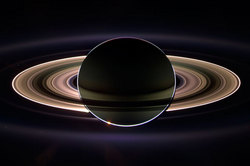 American astrologers have come to a startling conclusion after studying the system of Mars. As it turned out, after 40 million years the Red planet will absorb its own main satellite Phobos, pick up rings, like Saturn. American astrologers have come to a startling conclusion after studying the system of Mars. As it turned out, after 40 million years the Red planet will absorb its own main satellite Phobos, pick up rings, like Saturn.
As they say in the article, published in the journal Nature Geophysics, Phobos, 1 of the moons of Mars, will collapse within 20-40 million years and create a ring around the planet. This is the result of a simulation of a future Red planet, conducted by the astrologers from the Institutions of Berkeley and California.
The authors studied the decay of Phobos using the methods of computer prediction. To achieve the desired result, the astrologers made a model of the satellite on the basis of the available data on the density and stability of rocks. Calculations showed that the weakest parts of Phobos will start to disintegrate and form a ring approximately 20 million years.
The very process of decay of the satellite will occur extremely quickly - Phobos will be material for future rings of Mars for a few weeks. While on the Martian surface, this striking phenomenon can be monitored directly. The satellite begins to disintegrate and to form a Grand ring of fragmental material. Small particles will last in orbit for about 100 million years, then of course fall to the planet's surface.
As wrote earlier Days.Roux, during the 47th annual meeting of the Planetary division of the American astronomical community professionals space flight Center Goddard gave evidence that Phobos began to crumble under the action of tidal forces of Mars. So planetary scientists have come, having analysed the propagation of cracks in the vicinity of the crater of San MATEO.
According to the model proposed by the authors of the study, Phobos, which orbits Mars in a helical orbit at a height of 6 thousand km, annually approaching the red planet at 2 meters, in 30-50 million years, collapses under gravitational attraction. Part of small pieces of the satellite will collapse on the surface of Mars.
sections: Society, World News
|